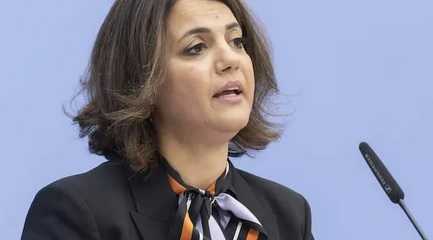
30 August 2023; MEMO: Libya’s beleaguered Foreign Minister has fled the country after her suspension, following the widespread backlash against her secret meeting with her Israeli counterpart last week, amid ongoing questions on whether the Libyan government knew of and planned the controversial meeting.
Following a leak of Libyan Foreign Minister, Najla Al-Mangoush’s meeting with her Israeli counterpart, Eli Cohen, in the Italian capital, Rome, Cohen confirmed in an Israeli Foreign Ministry statement on Sunday that “I spoke with the Foreign Minister about the great potential for the two countries from their relations”.
The two officials had discussed “the importance of preserving the heritage of Libyan Jews, which includes renovating synagogues and Jewish cemeteries in the country”, according to the statement. Cohen added that “Libya’s size and strategic location offer a huge opportunity for the State of Israel”.
The revelations have since resulted in widespread backlash from both the political and societal fronts, with street protests and riots erupting in the Libyan capital, Tripoli, and some other cities across the country to express outrage at the meeting and seeming efforts to normalise relations with Israel.
The Prime Minister of Libya’s internationally-recognised government, Abdul Hamid Dbeibah, suspended Mangoush from her position as foreign minister on Sunday as soon as the news broke, and also put her under investigation.
READ: Libya’s foreign minister is the latest victim of Israeli leaks
According to reports by the New York Times and Associated Press on Monday, which cited an anonymous Libyan Foreign Ministry official, Mangoush fled and had flown to Turkiye – a long-time backer and supporter of the UN-backed government in Tripoli – presumably from Italy after the news erupted, especially amid the uproar and investigation against her.
Amid the recent events, it remains disputed whether Dbeibeh and his government planned and lent support for the secret meeting – hosted by Italian Foreign Minister, Antonio Tajani – or whether Mangoush and Cohen had initiated it themselves.
Officials initially claimed the meeting had been a coincidental affair and was unplanned, but Mangoush later insisted that she would not have engaged in the talks without the approval of Prime Minister Dbeibeh.
Either way, the revelations have raised speculation over why Israel and its Foreign Ministry seemingly carelessly confirmed the meeting, despite knowing the risk it would pose to the Libyan government by the country’s population who are largely opposed to normalisation with Israel.
It has, subsequently, also reportedly raised concerns amongst Israeli analysts who say that the development is likely to discourage other leaders of Arab states and movements to advance normalisation talks with Israel, due to the occupation state’s seeming inability to keep such talks private.




